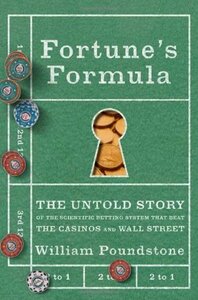Take a photo of a barcode or cover
informative
medium-paced
A disappointing and poorly written book.
Very interesting subject, but author bogged it down with an endless barrage of trivial irrelevant minutiae. All those disparate useless factoids about the Mob, Claude Shannon's marriage life, LTCM, Paul Samuelson's biography - all these seemingly unrelated strands were forcibly meshed together in a disjointed manner. Many chapters flash by without any link to the Kelly Criterion itself.
For a better book on Edward Thorp, read his biography A Man For All Markets. For a better book on Claude Shannon, read A Mind At Play. For a better book on applying the Kelly Criterion to investing, read Concentrated Investing. For a better take on the geek mathematics behind the Kelly Criterion, go read some academic papers, or even the Wikipedia page.
Very interesting subject, but author bogged it down with an endless barrage of trivial irrelevant minutiae. All those disparate useless factoids about the Mob, Claude Shannon's marriage life, LTCM, Paul Samuelson's biography - all these seemingly unrelated strands were forcibly meshed together in a disjointed manner. Many chapters flash by without any link to the Kelly Criterion itself.
For a better book on Edward Thorp, read his biography A Man For All Markets. For a better book on Claude Shannon, read A Mind At Play. For a better book on applying the Kelly Criterion to investing, read Concentrated Investing. For a better take on the geek mathematics behind the Kelly Criterion, go read some academic papers, or even the Wikipedia page.
Fortune's Formula was sitting on my shelf for a long time because I couldn't formulate a prediction regarding how (and how well) my (numerous) competing expectations for source material could be condensed or extrapolated into a book this size. Would it be boring and drawn out, would it be introducing brand new ideas and characters until the bitter end, or would the subject matter go ambitiously beyond the already-massive scope of the title?
For the uninitiated reader, all of my fears are realized. It's an amalgamation of many different stories piled into a narrative that tips the scale at dubiously long-winded. What is the book about? I couldn't answer that question using a paragraph, never mind a sentence. An action-packed lead-in gives way to lengthy descriptions, biographical facts, and figures which feels like a bait and switch. Gambling takes a back seat to Organized Crime which takes a back seat to Information Theory which takes a back seat to Wall Street which takes a back seat to more sophisticated gambling which... The story is a never-ending loop of some combination of these topics and it can be infuriating.
I enjoyed this work, both as a partial refresher on some of the best stories about gambling and investing and for the achievement that is William Poundstone's original research, arrangement, and storytelling. Approaching the end, it's important you've paid attention to some of the minute details surrounding different trading strategies and economic theories, otherwise you'll fail to see the significance of what he's talking about. Established (original) themes and sturdily-built characters feel contrived when bookended with rehashes of well-known people and events.
While one party may argue it's the keystone of Wall Street non-fiction, the other would have a point in saying an archway is only structurally sound if a keystone is set last, wedged into the apex.
For the uninitiated reader, all of my fears are realized. It's an amalgamation of many different stories piled into a narrative that tips the scale at dubiously long-winded. What is the book about? I couldn't answer that question using a paragraph, never mind a sentence. An action-packed lead-in gives way to lengthy descriptions, biographical facts, and figures which feels like a bait and switch. Gambling takes a back seat to Organized Crime which takes a back seat to Information Theory which takes a back seat to Wall Street which takes a back seat to more sophisticated gambling which... The story is a never-ending loop of some combination of these topics and it can be infuriating.
I enjoyed this work, both as a partial refresher on some of the best stories about gambling and investing and for the achievement that is William Poundstone's original research, arrangement, and storytelling. Approaching the end, it's important you've paid attention to some of the minute details surrounding different trading strategies and economic theories, otherwise you'll fail to see the significance of what he's talking about. Established (original) themes and sturdily-built characters feel contrived when bookended with rehashes of well-known people and events.
While one party may argue it's the keystone of Wall Street non-fiction, the other would have a point in saying an archway is only structurally sound if a keystone is set last, wedged into the apex.
informative
medium-paced
Not particularly well written, or all that interesting, even if you like the mathematical and financial part. Still, I did manage to finish it, so it couldn't have been all that bad.
An great teasing and enticing introduction to economic theory and financial statistics. Pure brain juice that inspires reflection.
Very little of the book was actually about the Kelly betting system. It seemed like Poundstone didn't have enough material to write a full book on the Kelly criterion, so you have very tangentially related stories that didn't add much value.
Read it before:
The Asylum: The Renegades Who Hijacked the World's Oil Market
The Swerve: How the World Became Modern
Boomerang: Travels in the New Third World
Read it after:
The Big Short: Inside the Doomsday Machine
The Asylum: The Renegades Who Hijacked the World's Oil Market
The Swerve: How the World Became Modern
Boomerang: Travels in the New Third World
Read it after:
The Big Short: Inside the Doomsday Machine
Interesting review of the history of gambling and how that relates to traders. There's also a great deal of comparisons between trading and gambling. Prose is rather hard to get through, though for the subject matter it's not too difficult a read. All in all a good book if you're interested in the subject, if it's a passing curiosity you should probably pass.





